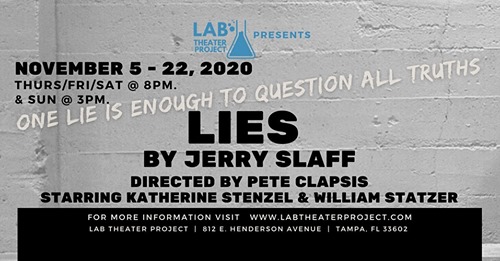Review: LIES HIDES PAINFUL TRUTH at LAB TheatreProject
If you’re told a lie long enough, you begin to believe it.

If you're told a lie long enough, you begin to believe it, says the riveting Katherine Stenzel as federal prisoner up for a second parole hearing, Lorelei Beatrice Beckmann. Along with her inexperienced public defender, Benny (William Statzer), we fall prey to her exploitation of the truth to suit her will, bent, twisted, but never fully broken.
LAB Theater's Lies, written by Jerry Slaff and expertly directed by Pete Clapsis, is confusing, but in a good way. The stark, bland backdrop of the interview room and minimal props translate well to a virtual viewing. Our attention is never distracted from William, completely believable as the lanky, young lawyer, who looks like he stepped out of high school mock trial rather than law school. His nervous ramblings and blustering upon the first introduction to Lorelei speak volumes about his fresh-out-of-law school naivety and eagerness to make a name for himself with her case.
Lorelie, a notorious American German World War II radio propagandist, sits looking bored and disinterested. Every word out of her mouth is maybe a half-truth. The parole interview evolves into a cat and mouse interrogation, but we really don't know who is manipulating whom. Lorelei is adamant that she does not want to be paroled. Benny counters that it doesn't matter what she wants; he's going to get her out of federal prison, even if her flat folder of information does not reveal her crime. His goal is to break her, make her pull fact from fiction, and confess. Her only goal is to have her lawyer drive out of his way to bring her a beloved pastry from a particular bakery.
Though it was set in 1950, some of the dialogue fit the volatile political climate of today. "If you can't trust your president to tell the truth, who can you trust?" or "When you lie, you lose your moral code as a people and a nation." or "You can have truth or justice, but not both."
Eventually, the pair relax into an uneasy relationship, and she reveals the truth she's denied. But do we believe her, or is this another manipulation? In the end, it is that simple, surprising pastry that holds the key to unlocking and verifying all of Lorelie's tales.
Reader Reviews

Videos

